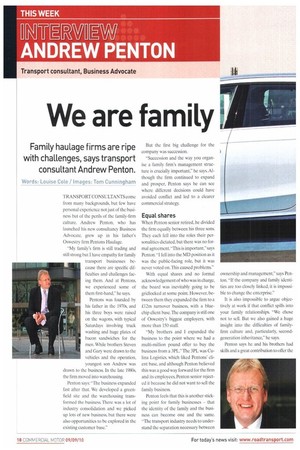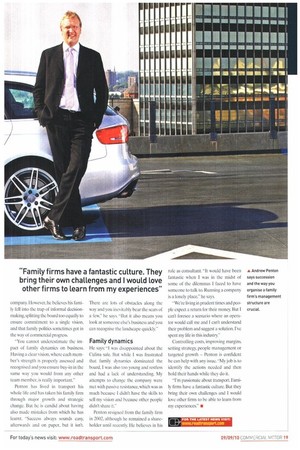We are family
Page 138

Page 139

If you've noticed an error in this article please click here to report it so we can fix it.
Family haulage firms are ripe with challenges, says transport consultant Andrew Penton.
Words: Louise Cole Images: Tom Cunningham TRANSPORT CONSULTANTS come from many backgrounds. but few have personal experience not just of the business but of the perils of the family-firm culture. Andrew Penton, who has launched his new consultancy Business Advocate, grew up in his father's Oswestry firm Pentons Haulage, "My family's firm is still trading and still strong but! have empathy for family transport businesses because there are specific difficulties and challenges facing them. And at Pentons. we experienced some of them first-hand," he says.
Pentons was founded by his father in the 1970s, and his three boys were raised on the wagons, with typical Saturdays involving truck washing and huge plates of bacon sandwiches for the men. While brothers Steven and Gary were drawn to the vehicles and the operation, youngest son Andrew was drawn to the business. In the late 1980s. the firm moved into warehousing.
Penton says: "The business expanded fast after that. We developed a greenfield site and the warehousing transformed the business. There was a lot of industry consolidation and we picked up lots of new business, but there were also opportunities to be explored in the existing customer base." But the first big challenge for the company was succession.
-Succession and the way you organise a family firm's management structure is crucially important," he says. Although the firm continued to expand and prosper, Penton says he can see where different decisions could have avoided conflict and led to a clearer commercial strategy.
Equal shares
When Penton senior retired, he divided the firm equally between his three sons They each fell into the roles their personalities dictated, but there was no formal agreement. "This is important," says Penton."I fell into the MD position as it was the public-facing role, but it was never voted on. This caused problems" With equal shares and no formal acknowledgement of who was in charge, the board was inevitably going to be gridlocked at some point. However, between them they expanded the firm to a ft 2m turnover business, with a bluechip client base. The company is still one of Oswestry's biggest employers, with more than 150 staff.
"My brothers and I expanded the business to the point where we had a multi-million pound offer to buy the business from a 3PL." The 3PL was Culina Logistics, which liked Pentons' client base, and although Penton believed this was a good way forward for the firm and its employees, Penton senior rejected it because he did not want to sell the family business.
Penton feels that this is another sticking point for family businesses that the identity of the family and the business can become one and the same. "The transport industry needs to understand the separation necessary between ownership and management," says Penton. "If the company and family identities are too closely linked, it is impossible to change the enterprise."
It is also impossible to argue objectively at work if that conflict spills into your family relationships. "We chose not to sell. But we also gained a huge insight into the difficulties of familyfirrn culture and, particularly, secondgeneration inheritance," he says.
Penton says he and his brothers had skills and a great contribution to offer the company. However, he believes his family fell into the trap of informal decisionmaking, splitting the board too equally to ensure commitment to a single vision, and that family politics sometimes got in the way of commercial progress.
"You cannot underestimate the impact of family dynamics on business. Having a clear vision, where each member's strength is properly assessed and recognised and you ensure buy-in in the same way you would from any other team member, is really important."
Penton has lived in transport his whole life and has taken his family firm through major growth and strategic change. But he is candid about having also made mistakes from which he has learnt. "Success always sounds easy, afterwards and on paper, but it isn't. There are lots of obstacles along the way and you inevitably bear the scars of a few," he says. "But it also means you look at someone else's business and you can recognise the landscape quickly."
Family dynamics He says: "I was disappointed about the Culina sale. But while I was frustrated that family dynamics dominated the board, I was also too young and restless and had a lack of understanding. My attempts to change the company were met with passive resistance, which was as much because I didn't have the skills to sell my vision and because other people didn't share it."
Penton resigned from the family firm in 2002, although he remained a shareholder until recently. He believes in his
role as consultant. -It would have been fantastic when I was in the midst of some of the dilemmas I faced to have someone to talk to. Running a company is a lonely place,he says.
"We're living in prudent times and people expect a return for their money But cant foresee a scenario where an operator would call me and I can't understand their problem and suggest a solution. I've spent my life in this industry.
Controlling costs, improving margins, setting strategy people management or targeted growth — Penton is confident he can help with any issue. "My job is to identify the actions needed and then hold their hands while they do it.
"I'm passionate about transport. Family firms have a fantastic culture. But they bring their own challenges and I would love other firms to be able to learn from my experiences•
























































































































































































































































